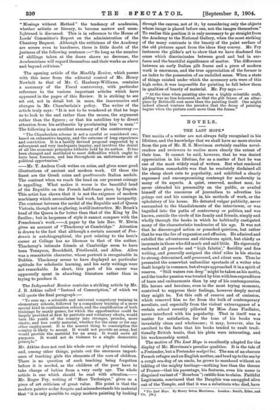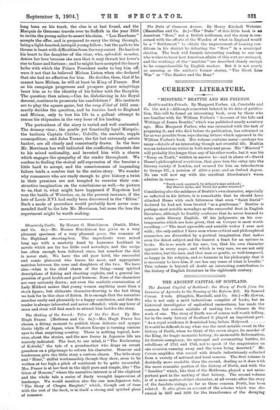THE LAST HOPE.* THE merits of a writer are not
always fully recognised in his lifetime, and the knowledge that we shall have no more stories from the pen of Mr. H. S. Merriman certainly enables novel- readers and reviewers to realise more clearly the extent of their loss. It cannot be said, however, that he was denied
appreciation in his lifetime, for as a matter of fact he was one of the most widely read of writers. But what rendered his position remarkable was that he resolutely disdained all the cheap short cuts to popularity, and exhibited a clearly expressed and uncompromising contempt for modernity in many of its aspects. A quiet, reserved, modest man, he never obtruded his personality on the public, or availed himself of the resources of journalism to advertise his goings out and his comings in, his methods of work, or the upholstery of his house. He detested vulgar publicity, never succumbed to the blandishments of the interviewer, or was beguiled into the paths of controversy or politics, and was known, outside the circle of his family and friends, simply and wholly through the books in which he habitually castigated many of the characteristic tendencies of his age. It was not that he discouraged action or preached quietism, but rather that he was the foe of expansion and effusion. He admired and extolled the adventurous and chivalrous spirit, but chiefly as incarnate in those who did much and said little. He rigorously eschewed all panache and "high falutin'," floridity and fine writing, and generally assigned the chief roles in his stories to strong, determined, self-possessed, and silent men. Thus he presented the somewhat unfamiliar spectacle of a writer who dealt largely in romance, but always approached it in a spirit of reserve. "Still waters run deep" might be taken as his motto, and the tender passion was treated by him with less expenditure of tears and endearments than by any of his contemporaries.
His heroes and heroines, even in the most trying moments, contrived to suppress their feelings, however deeply moved they might be. Yet this cult of reserve and of omission, which removed him so far from the bulk of contemporary novelists, and especially from the violent extravagance of a certain school recently pilloried by Miss Jane Findlater, never interfered with his popularity. That in itself was a matter for satisfaction, for the tone of his books was
invariably clean and wholesome ; it may, however, also be ascribed to the facts that his books tended to exalt tradi- tionally British traits, that his plots were interesting, and his workmanship sound.
The motive of The Last Hope is excellently adapted for the display of Mr. Merriman's peculiar qualities. It is the tale of a Pretender, but a Pretender malgrelui. The son of an obscure French refugee and an English mother, and bred up to the sea by a rough sea-dog of an uncle, he grows to manhood without an inkling of the mighty heritage—nothing leas than the throne of France—that his parentage, his features, even his name (a disguised variant of " Bourbon ") entitle him to claim. Faithful Legitimists, convinced that the Dauphin was smuggled alive out of the Temple, and that it was a substitute who died, have
• The Last Hope. By Henry Seton Merriman. London : Smith, Elder, and Co. [60.] long been on his track, the clue is at last found, and the Marquis de Gemosac travels over to Suffolk in the year 1850 to invite the young sailor to assert his claim. "Loo Barebone " accepts the offer, and is prepared to carry the thing through, being a light-hearted, intrepid young fellow; but the path to his throne is beset with difficulties from the very outset. He has lost his heart to the daughter of the vicar, who, splendide mendax, denies her love because she sees that it may thwart her lover's rise to fame and fortune ; and he might have accepted the heavy bribe with which the Prince President seeks to buy him off, were it not that he believed Miriam Listen when she declared that she had no affection for him. He decides, then, that if he cannot have Miriam, he will at least be King of France. But as his campaign progresses and prospers grave misgivings beset him as to the identity of his father with the Dauphin. The question then arises,—Can he, disbelieving in his Royal descent, continue to prosecute his candidature ? His instincts are to play the square game, but the coup d'gtat of 1851 sum- marily decides the question, and he hurries back to England and Miriam, only to lose his life in a gallant attempt to rescue his shipmates in the very hour of his landing.
The portraiture of the story is varied and well contrasted. The dreamy vicar; the gentle yet fanatically loyal Marquis ; the taciturn Captain Clubbe ; Colville, the amiable, supple cosmopolitan; and John Turner, the fat but extremely astute banker, are all clearly and consistently drawn. In the hero Mr. Merriman has well indicated the conflicting elements due to his mixed nationality, and invested him with a charm which engages the sympathy of the reader throughout. We confess to finding the stoical self-repression of the heroine a little hard to accept, and the consciousness of impending failure lends a sombre tint to the entire story. We wonder why romancers who are ready enough to give history a twist in their premises are not tempted to exercise their con- structive imagination on the conclusions as well,—to picture to us, that is, what might have happened if Napoleon had won the battle of Waterloo, or, in the present instance, if the heir of Louis XVI. had really been discovered in the "fifties." Such a mode of procedure would probably have never com- mended itself to the late Mr. Merriman, but none the less the experiment might be worth making.







































 Previous page
Previous page